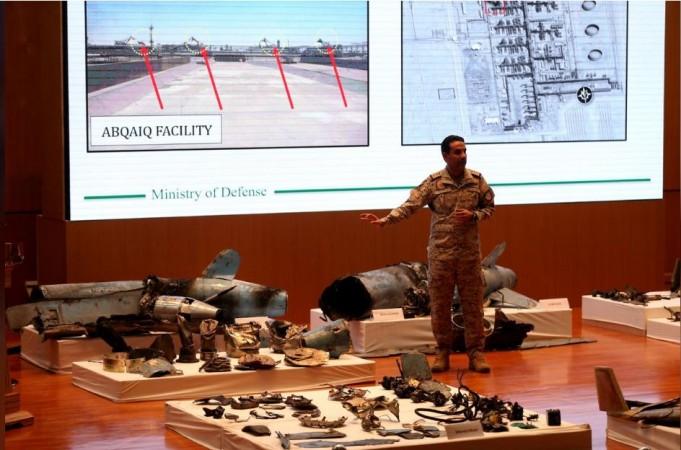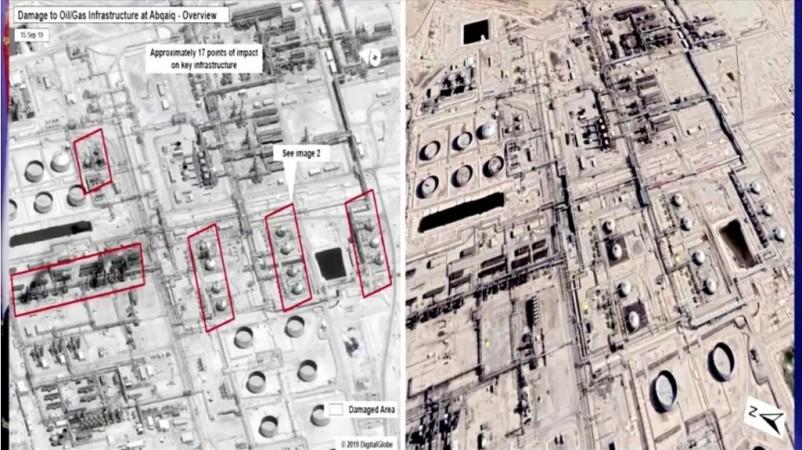
Yemen's Houthi rebel group on Wednesday stated that it has identified dozens of cites as possible targets in the United Arab Emirates, minutes after Saudi Arabia stated that the attacks on its oil facilities came from the "north" and "unquestionably" sponsored by Iran.
Warning of "one operation" that would cost the Emirati regime "dearly", Houthi military spokesperson Yahya Saria said in a televised speech, "Today and for the first time we announce that we have dozens of targets within our range in the UAE, some are in Abu Dhabi and can be attacked at any time," reported Reuters.
He also stated that the Houthis have new drones with "normal and jet engines" that are capable of reaching targets deep in Saudi Arabia.
Providing details of the attacks, Saria said they were launched from three locations.
The Qassef 3 drones were launched from one site, Samad 3 drones from another and unnamed jet-powered drones from a third, he said.
"These drones ... carried four precise bombs per strike," Saria said.
Other drones were also "used to confuse the enemy so the main planes could reach their targets," he said.
However, 30 minutes after the Houthi statement, Saudi Arabia denied Yemen's involvement and said that it was "covering up" for Iran.
"The attack was launched from the north and unquestionably sponsored by Iran," Saudi defence spokesperson Colonel Turki al-Malki said.
Referring to recovered pieces of cruise missile and drones used in the oil strikes, he said around 18 drones and seven cruise missiles were fired at the two key oil production installations from a direction that could not have been possible if it was fired from Yemen.
Al-Malki stated that the cruise missile, which had a range of 700 km, could not have been fired from Yemen's territory. Playing a surveillance video that showed the missile coming from the north, he stated that not only the northern direction but the equipment itself indicated Iranian involvement.
"This is the kind of weapon the Iranian regime and the Iranian IRGC (Islamic Revolutionary Guard Corps) are using against the civilian ... facilities," he was qouted as saying by Al Jazeera.
He dismissed Houthi claims of carrying out the attacks and stated: "Despite Iran's efforts to make it appear so they did not originate from Yemen." He said that the strike was "beyond Houthi's capabilities" who have conducted several smaller attacks on Saudi territory.
However, while responding to questions raised about Iran's involvement, al-Malki did not directly blame Iran for the attacks. He told reporters that once "the culprits" are identified, they would "be held accountable".
"Act of war"
The varying statements made by Saudi Arabia and Yemen was followed by the US Secretary of State, Mike Pompeo, condemning the attacks which he claimed was "an act of war" by Iran.
"This was an Iranian attack," Pompeo told reporters on his plane before landing in Jeddah. "This is an attack of a scale we've just not seen before."

Pompeo flew to the Kingdom to discuss the attacks with the Saudi crown prince, Mohammed bin Salman, and decide upon its response.
US President also announced plans of implementing fresh sanctions on Iran and has ordered the US Treasury to "substantially increase sanctions" on the country.
Iranian Foreign Minister Mohammad javed Zarif condemned the sanctions as "illegal" and "inhuman" on Twitter adding that the "admission that (the) US is DELIBERATELY targeting ordinary citizens."
Earlier reports suggested that the White House ordered the Pentagon to plan a strategic response to the attacks on Saudi Arabia's oil facilities. Despite US President Donald Trump claiming that they are in no rush to push for retaliation, he claimed that the US defence was "locked and loaded".
The attacks on Saudi Arabia's state-owned Aramco oil facilities on September 14 resulted in limiting its production to half of its potential. More than 5 percent of the global daily crude oil supply was affected due to the attacks. On Monday, global oil prices rose to their highest since the 1991 Gulf war.
















